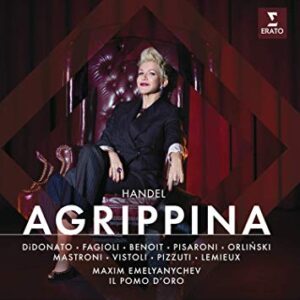Handel’s Agrippina is a veritable fiesta of sly manipulation and corruption. Almost every character lies to every other and the result is a wicked comedy that tickles the fancy of a cynical audience. If ever there were a time in which the public was ready to watch crooked politicians manage and mismanage the world around them, we are in it. Not since ancient Rome, in fact, has it been as easy to shake one’s head and force oneself to laugh at such marvelous wickedness.
Our eponymous heroine, a woman without scruples, wishes to get her hands on the throne for her petulant, unhinged son Nero. First she tells her husband, the emperor Claudius, a clumsy buffoon devoid of dignity, that Ottone, who loves the sexy, ambitious Poppea, wants the throne more than he loves Poppea. Poppea pretends to love Claudius. Nero courts Poppea, who loves only Ottone (the only decent character in the opera). Narciso and Pallante are goofy, untrustworthy courtiers who are emotionally toyed with by both Agrippina and Poppea.
At the end, Claudius demands that Nero marry Poppea and names Ottone his successor, but Ottone refuses out of love for Poppea. Then, reversing his decision, he names Nero emperor and Ottone and Poppea marry. The opera ends there, but Schadenfreude demands that we look at history: Nero eventually banishes Ottone and marries Poppea. He then has his mother murdered and later stomps Poppea to death. And so it goes.
I can’t imagine a finer Agrippina today than Joyce DiDonato. Technically she can move from a whisper/whimper to a roar–give a listen to her work on the great aria “Pensieri….” She begins the aria’s da capo an octave lower than written and pianissimo; she sounds like the saddest cello in the world. And when she roars, all hell breaks loose, with rapid-fire coloratura always accurate and always serving a dramatic purpose. She can wheedle, cajole, and menace–the very definitions of Agrippina’s character. Wow. In “Se vuoi pace”, in which she seems to be reconciling with Claudio, her smooth legato is ravishing, and the way she toys with Narciso and Pallante is wickedly funny.
Poppea is sung here by Elsa Benoit, elsewhere a Gilda, Musetta, and Zerlina. Her innocence clearly dropped for the role of Poppea, she is wonderfully fluid and insinuating, and her “Bel piacere”, a genuine moment of love for Ottone, is stunning.
Ottone is the magnificent countertenor Jakub Jozef Orlinski, whose pure tone and gorgeous phrasing define this decent character. He and Benoit shine in their duet. Nero is a pivotal role, one that is easy to overdo, and in fact, the remarkably agile and almost three-octaved Franco Fagioli overdoes it. That his countertenor can handle it all is spectacular, but his nasty-boy tone (which he can change on a dime) can hector. Luca Pisaroni’s handsome tone and dignity make a case for liking the bumbling Claudio, with a fine reach down to a low D. The others in the cast are splendid–Andrea Mastroni as Pallante and Carlo Vistoli as Narciso.
Maxim Emelyanychev leads Il Pomo d’Oro with something approaching controlled glee, with recits savored as much as arias. Kudos to first oboist as well. The engineering is perfect and so is the balance; voices and instruments shine and intermingle. Move over other recordings of this opera: this is the champ.
































